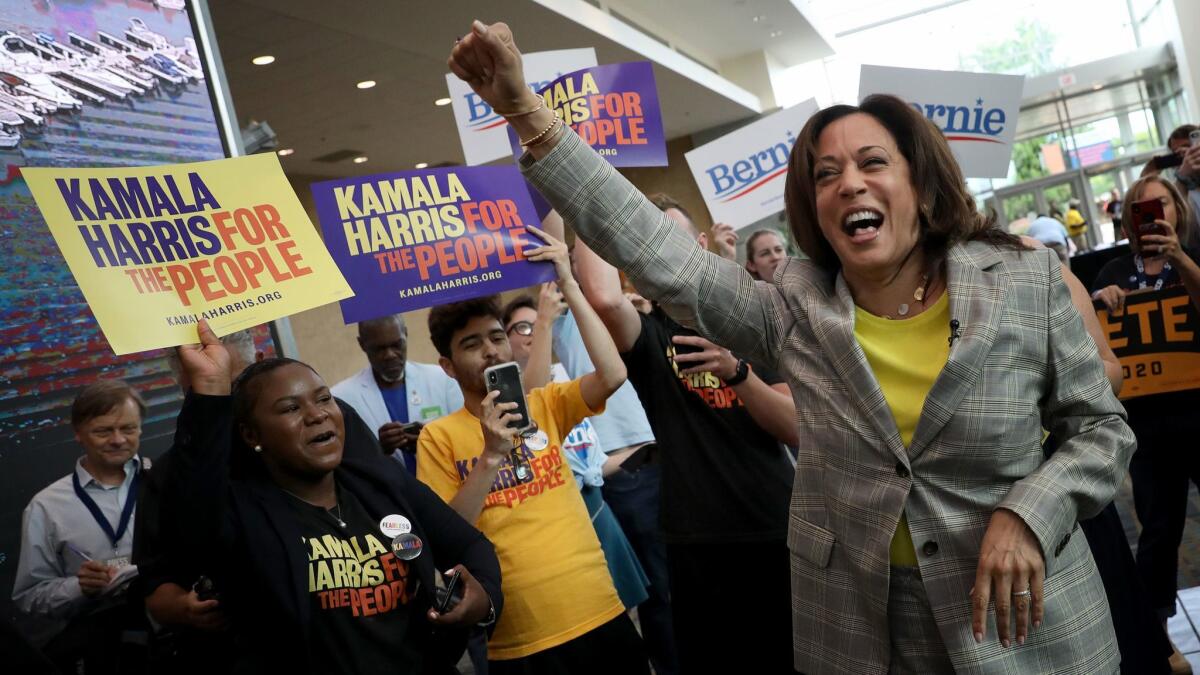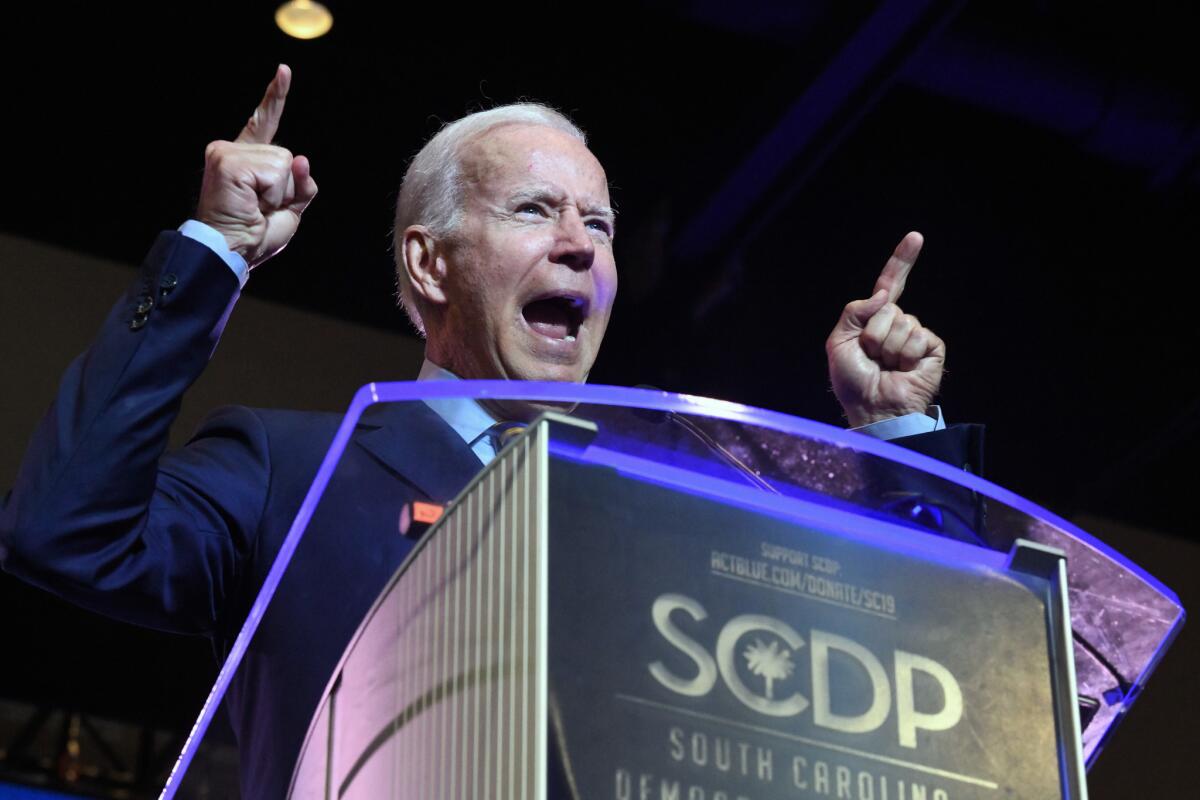2020 candidates show unity in South Carolina, wooing black voters and easing up on Biden

- Share via
Reporting from COLUMBIA, S.C. — Bakari Sellers doesn’t mince words when he explains why winning the Democratic primary in South Carolina is crucial for the 22 presidential candidates who flocked here over the weekend.
“Because people who look like my mom and her friends are going to choose the nominee,” said the former state lawmaker, who became the youngest black man to hold public office in U.S. history in 2006, when he was 22.
“You don’t really get that in Iowa or New Hampshire,” Sellers said in an interview at the state Democratic Party convention Saturday, where the contenders each had just a few minutes onstage to make their pitches to the thousands in attendance.
Black voters will play a key role in choosing Democrats’ 2020 nominee, and South Carolina, which holds the fourth contest of the nominating fight and the first in the South, will present candidates an important early test of their strength in the African American community.
California Sen. Kamala Harris — who almost certainly needs to win South Carolina’s February primary to have a shot at the nomination, and who has Sellers’ endorsement — embraced him as she walked by. Then the senator, who aims to be the first woman of color elected president, bent down to speak with a bashful African American girl.
That’s presidential politics in South Carolina: a mix of blunt talk, charm offensives, close encounters with candidates, and, at times, some uncomfortable racial and social realities.
As the candidates made their pitches to the party faithful in the state, where African Americans make up about 60% of the Democratic electorate, two of them faced controversies involving race.
Former Vice President Joe Biden has been fending off criticism over comments about his ability to work with segregationists early in his political career. And South Bend, Ind., Mayor Pete Buttigieg was dealing with the aftermath of a fatal police shooting of a black man in his town.
The Democratic candidates, who worked to present a united front over the weekend, talked about race and bigotry but mostly avoided addressing the Biden and Buttigieg issues head-on.

Biden’s past affiliations and remarks about being “civil” with segregationists didn’t sit well with some black voters who attended events this weekend, but many were willing to give him the benefit of the doubt.
“He was Obama’s vice president and that is a major connection right now for a lot of people in South Carolina, even with his mishaps and slip-ups,” said Jennifer Morrow, a member of the South Carolina Black Women’s Caucus.
Polls show Biden leading his rivals among South Carolina Democrats, African Americans included.
Valerie Aiken, who hosted a Harris meet-up on Friday, said she continues to like Biden along with Harris, who leveled a broadside against the former vice president Saturday when she told reporters of his work with segregationists: “If the people he was talking about with such affection had their way, I would never have been able to be a United States senator.”
Joe Biden’s nostalgic remark about segregationist senators draws criticism »
Sen. Cory Booker of New Jersey, who demanded that Biden apologize over the comments, declined to elaborate as he joined a party with supporters at the convention center. “I’ve said my piece,” he said.
Convention delegate Elease Lloyd still ranks Biden ahead of her other favorites, Harris and Booker, though she’d be happy with any of them if they have a strategy to relieve the country of “all of this foolishness with Trump.”
Of Biden, she said, “You have to allow people to redeem themselves, and I believe he’s redeemed himself for the things he’s said in the past. I think he’ll rise above this.”
For Derrick Quarles, who started two Black Lives Matter chapters in the state, enough is almost enough when it comes to Biden.
“It’s not that I can’t get past it; it’s just that Joe Biden has a lot of slip-ups,” said Quarles, 32.
He thinks the Biden controversy could be a teachable moment for the country on tolerance and the potential value of working across bitter dividing lines, even if that sometimes means reaching out to racists if it will lead to a greater good.
But there’s a limit.
“At some point, if he continues to slip, I’m going to believe that’s who he really is,” Quarles said. “I’ll forgive, but then I’ll cut you off.”
Buttigieg had mostly stayed off the campaign trail last week when tensions gripped his hometown after a white police officer shot and killed a black man.
The South Bend mayor received a warm reception from convention-goers Saturday when he talked up his proposal to boost the economic fortunes of African Americans in the same way that the U.S. devoted billions to rebuild Western Europe after World War II.
Lloyd said she’s more focused on the pressing issues facing her rural community. For starters, the county she lives in hasn’t had a hospital since the last one shut down in the 1990s.
Many of the candidates who spoke at the convention did so with that kind of granular detail.
“What makes South Carolina so important is this: How South Carolina goes, so goes the South,” Harris supporter Clark Armstead said, noting the state’s place in history as the first to secede from the Union in the lead-up to the Civil War. “If you’re gonna take the South,” she said of the Democratic hopefuls, “you’ve got to take South Carolina first.”
Jennifer Clyburn Reed, daughter of Rep. James E. Clyburn and vice chair of the Democratic Black Caucus of South Carolina, said she was thrilled that so many Democrats are competing this election season.
“We want to hear for ourselves, directly from the candidates: What are you going to do for me?” she said. “They’re going to have to work for our vote.”
Many took that to heart. Several candidates recently visited a traditional African American Gullah Geechee community on the coast to talk issues with voters there. Booker added visits to two local barbershops with African American clienteles to his day’s itinerary. And on Friday night, 21 candidates mingled among thousands at Rep. Clyburn’s annual fish fry for the Democratic faithful.
Morrow was impressed with how Booker sat with voters during a visit to the Gullah Geechee community on Hilton Head Island. “He was like, ‘We’re going to talk. What can I do for you?’”
“That getting out, that meet-and-greet, makes a huge difference in South Carolina,” she said.
But the party faithful in South Carolina also know they’re up against something different in President Trump, who many blame for unlocking the lowest impulses of the country.
African Americans in the South are dealing with gaping wealth disparities between black and white people, worse educational and healthcare outcomes, inequities in the criminal justice system and a surge of racially motivated hate crimes since the 2016 presidential election.
“All that we’re seeing now is the backlash — or ‘whitelash’ — over the Obama administration,” said Vivian Clark Armstead, who attended the Harris meet-up on Friday.
Kamala Harris and Cory Booker embrace new era for black candidates post-Obama »
More to Read
Get the L.A. Times Politics newsletter
Deeply reported insights into legislation, politics and policy from Sacramento, Washington and beyond. In your inbox twice per week.
You may occasionally receive promotional content from the Los Angeles Times.











